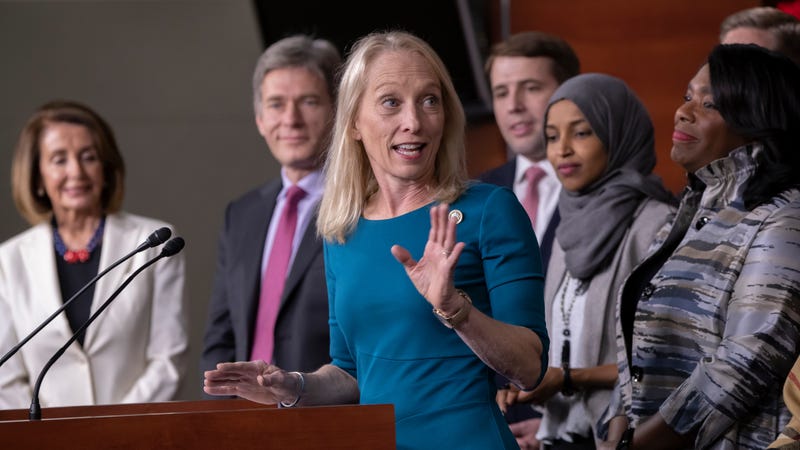 Recently sworn in, Rep. Mary Gay Scanlon of Pennsylvania is among the list of Democrats who’ve stated they will not support an effort to overturn the FCC’s decision in Congress.Photo: AP/J. Scott Applewhite
Recently sworn in, Rep. Mary Gay Scanlon of Pennsylvania is among the list of Democrats who’ve stated they will not support an effort to overturn the FCC’s decision in Congress.Photo: AP/J. Scott Applewhite
Net neutrality proponents now have less than two weeks to convince 38 House lawmakers to support an effort to overturn the Federal Communications Commission’s repeal of net neutrality. Seventeen of those votes could come from Democrats who have yet to sign on—all of whom have received significant contributions from internet service providers such as Comcast.
Under the Congressional Review Act (CRA), Congress could reverse the controversial FCC rules passed in a party-line vote last December, which effectively reversed the 2015 Open Internet Order that had established net neutrality principals as federal regulation. In May, the U.S. Senate passed a CRA resolution for this purpose with the aid of three Republicans.
Unfortunately for net neutrality supporters, the CRA rules for the House and Senate differ in one significant respect: In the Senate, a discharge petition forcing a vote on a CRA resolution does not require a majority; only 30 signatures were needed. In the House, however, a majority, or 218 signatures, are required before a vote will be scheduled.
As it stands, only 180 lawmakers have signed the House discharge petition, and the CRA resolution must be brought to a vote before the end of the year—else it gets squashed. The technical deadline to gather the remaining 38 signatures expired yesterday, December 10; however, the ongoing battle between Democrats and the White House over government funding has effectively extended that deadline until December 21.
Forcing a vote in the House is seen by some net neutrality proponents as a victory in and of itself, regardless of the outcome. It would force many lawmakers who’ve remained silent on the issue to cast a vote either in support of or against net neutrality, establishing a record of their position, which may be held against them in some future campaign.
Net neutrality activists—and in particular, the organization Fight for the Future—have formed campaigns to target Democrats who’ve yet to sign the discharge petition. Outside Washington, net neutrality enjoys significant support from both Democrat and Republican voters. Inside it remains a mostly partisan issue. Activists attribute the silence of the 17 House Democrats to “fistfuls of money” (campaign contributions) from telecom lobbyists.
The website demsagainstthe.net, established by Fight for the Future, chronicles the amounts of money received by Democrats who’ve yet to sign the petition and encourages constituents to contact the lawmakers and question them about their position on net neutrality.
Activists marked Rep. Mary Gay Scanlon, a Democrat of Pennsylvania, who was sworn in less than a month ago, as a particularly egregious case. In a Facebook video this week, Scanlon acknowledged having received numerous calls from constituents, but claimed she was refusing to sign on to the CRA because it is, she said, an “an arcane congressional maneuver.” (The Congressional Review Act was enacted in 1996.)
Scanlon, whose campaign’s second largest contributor was Comcast and whose office has dodged inquiries from reporters, also claimed there was “no way” the required number of signatures would be collected before the December 10 deadline, failing to inform the some 3,000 Facebook viewers that the deadline has actually been extended. (It’s unclear whether Scanlon was misinformed.)
Scanlon also echoed a common telecom industry talking point: That net neutrality should only be addressed through congressional legislation, and that it should not fall under the purview of federal regulators—even though the FCC’s ability to enact administrative law stems entirely from legislation passed by Congress. This argument is oft-used by Republican lawmakers and net neutrality opponents when attempting to derail congressional efforts to overturn the FCC’s decision.
Scanlon’s office was not taking calls on Tuesday, citing a move to her new office. Her communications director, Gabby Richards, did not immediately respond to a request for comment sent by email.
Share This Story